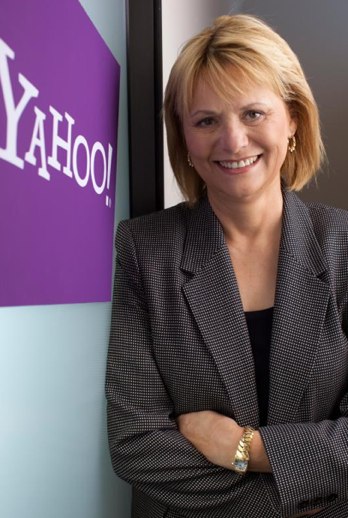Bartz to Yahoo shareholders: Change is coming; We're not Google

Yahoo's Carol Bartz took the stage at her first annual shareholder's meeting as CEO this morning. The first half of the meeting was business as usual, specifically votes on the re-election of board members and other official business facing the board. It wasn't until about halfway through the meeting that the main event - Bartz' presentation and Q&A - started.
Before questions, Bartz addressed the one big question that continues to surface: a deal with Microsoft on the search business. The official Bartz-esque answer: "If we ever have a deal with Microsoft, it will be announced publicly. Until we do, there's nothing to say."

She also tackled a question about Yahoo's competitive position against Google. Bottom line, she said: Google and Yahoo are different companies with different models. Google, she said, is "basically a pure search company... We're selling the complete view."
Yahoo, she said, "is the largest online media company, powered by fantastic technology." Yahoo is the place where people come for the valuable information in their lives - mail, messaging, search, sports news, financial news, entertainment news. In fact, she said, 12 percent of online time in the U.S. is spent on a Yahoo property.
"We are not Google," she said. "We only have part of our business that does what they do." To directly compare the two is "not fair for Yahoo and frankly not relevant."
Next question, please.
Bartz was also grilled about China, specifically censorship and human rights violations there, a long-running point of controversy following Yahoo's years-ago role in providing identifiable information about Pro-democracy writers in China who were later jailed. While Bartz said she and the company are very committed to doing what's right in terms of protecting human rights, she was also quick to note - quite frankly - that "it is not our job to fix the Chinese government. It's that simple."
"We respect human rights. We do what's right but we are not going to take on every government in the world as our mandate. That's not the mandate that shareholders have given us," she said.
Finally, Bartz - who earlier in the discussion had a friendly exchange with a shareholder over the overload of entertainment news on Yahoo pages - was asked whether this was the right time for Yahoo to buy or invest in newspapers, potentially as a means of bringing in more news-like content.
The short answer is no. It's not necessary to buy newspapers. Newspapers, like many other industries, need to rethink their business models. For now, Yahoo is happy to partner with them on advertising and content-sharing.
As for what's ahead, Bartz said they are looking at everything - from a modernization of Mail to a re-design and customization of the home page to shutting down, repairing or outsourcing other Yahoo properties that may have fallen by the wayside over the years and could leave the visitor with a bad taste for the overall property.
There's a lot of work left to do. Bartz said the company knows its vision but has had a problem with execution. She recognizes it, she said. And they're working on it.